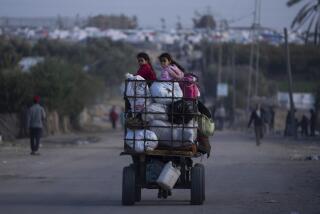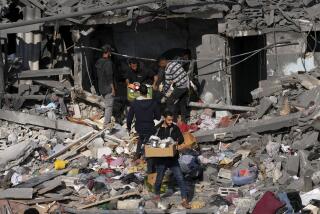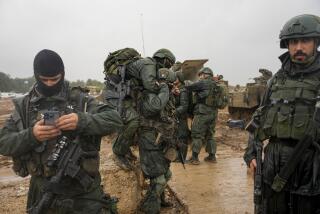Fierce Clashes Mark Bid to End Siege of Sarajevo
- Share via
SARAJEVO, Bosnia-Herzegovina — Heavy fighting erupted around this besieged capital Thursday as Bosnian government forces launched fierce artillery attacks on Bosnian Serb positions and vowed to free the city of a 38-month rebel Serb stranglehold.
Attacking on three fronts, government troops shelled Bosnian Serb-held territory north and west of Sarajevo, while the better-armed nationalist Serbs hit back.
“Our army has been ordered to undertake measures aimed at preventing any further strangulation of the city,” Bosnian President Alija Izetbegovic said late Thursday in confirming that the offensive was under way. “The world was doing nothing to prevent an obvious catastrophe.”
In Sarajevo, the government imposed extraordinary security measures, declaring a rare, nationwide state of emergency and ordering residents in the capital off the streets. Television crews were also banned.
Interior Ministry agents, going door to door, ordered stores and offices closed. A curfew was expanded by two hours to begin at dusk. Sarajevans hoarded the little food they could find and sandbagged their homes.
Possibly in response to the offensive, the Bosnian Serbs said they have now decided not to release 26 of their hostage United Nations peacekeepers until four of their own men in U.N. custody are freed, U.N. officials said.
In Halifax, Canada, President Clinton and the leaders of Britain, Canada, France, Germany, Italy and Japan, who are gathered for the annual summit of the world’s richest democracies, urged an “immediate moratorium on military operations” in Bosnia, and also called on Croatia and Serbia “to refrain from all military action.”
The call for restraint, read by the summit’s host, Canadian Prime Minister Jean Chretien, was prepared after the leaders summoned their foreign ministers to what had been planned as a dinner for only the presidents and prime ministers, but which was expanded as concern over Bosnia mounted.
It was not clear whether Thursday’s fighting marked the start of a long-awaited offensive to punch through rebel Serb forces that have circled the city for three years.
The estimated 15,000 troops the government has massed north of here in recent days are not considered to be a large enough force to break the siege--a bloody operation that would claim many civilian lives in a war in which an estimated 200,000 people have already been killed.
Even if the objectives of Thursday’s fighting are more limited, it marked a major escalation in warfare and a new confidence and aggressiveness on the part of the Bosnian government army.
*
The offensive appeared aimed at cutting a key Bosnian Serb supply route north of Sarajevo and tying up opposition troops while government forces consolidate gains south of Sarajevo along the strategic Trnovo road, which intersects rebel-held territory.
The government wants to whittle away at a swath of Bosnian Serb-held territory that separates Sarajevo from government-held territory in central Bosnia. If successful, these gains will provide important support for a largereventual offensive to open the capital, military experts say.
“We are going to give our people some hope,” said Kemal Muftic, senior adviser to the Bosnian government.
The Bosnian government says it has faced the reality that the West is not going to save Sarajevo, and it has pledged to end the siege by force before the winter.
The Bosnian Serbs have blocked food convoys for weeks and closed Sarajevo’s lifeline airport 2 1/2 months ago.
Striking before dawn with mortars and artillery, the government army attacked the rebel Serb-held town of Ilijas, 13 miles north of Sarajevo, then later hit Vogosca, just three miles north of Sarajevo.
The United Nations reported five to six shells a minute falling during the two-hour peak of the Vogosca battle.
Later, government and Bosnian Serb forces fought for control of the Lipa hill north of Sarajevo and along another strategic road and rebel Serb supply route. The United Nations reported 1,600 explosions in a four-hour period, indicating heavy shelling.
Firefights were also reported near Bare, about four miles west of Sarajevo, and government troops seized a T-55 tank from a U.N. weapons-collection depot in the center of Sarajevo.
The government also put up 22 roadblocks overnight in the general area of the combat and restricted movements by U.N. military observers. It closed the only road into Sarajevo that it controls, a route over Mt. Igman, essentially sealing the city.
Two shells fell in Sarajevo near the television station that is used by most international television reporters. Two Sarajevans passing in a bus were wounded.
The relatively new Bosnian army has improved dramatically in the past year. It has grown to a force of almost 200,000 troops, including Bosnian Croat militia. They have armed themselves with weapons imported despite an embargo, as well as with captured and manufactured weaponry. The government force is more mobile than the Bosnian Serb army, which is spread out over large chunks of territory.
*
Still, the Bosnian Serb army, while numbering only 80,000 or so soldiers, is more experienced and well-equipped with the heavy weapons that its enemies do not have.
Warning that Bosnia’s Muslim-led government is courting disaster, Bosnian Serb leaders said Thursday that they will repel the offensive.
It “is an adventure that will bring our enemy a new defeat,” said Bosnian Serb Gen. Dragamir Milosevic, who heads the rebel Serb army’s Sarajevo command.
Bosnian Serb leader Radovan Karadzic told reporters in the rebel stronghold of Pale, 10 miles east of Sarajevo: “This shows that the Muslims are not ready for a political solution.”
The Bosnian government has agreed to a peace plan proposed by the world’s major powers, but Karadzic and the Bosnian Serbs have repeatedly refused to consider it, even though it would allow them to keep most of the land they seized in the past three years of war.
The Bosnian Serbs also said they will not release 26 peacekeepers taken hostage last month after air strikes conducted by the North Atlantic Treaty Organization.
They insisted that the United Na-tions free four Serbs captured after they attacked a French observation post.
An additional 92 peacekeepers remain at posts with varying degrees of rebel Serb-imposed restrictions on their movements, U.N. officials said. Because many are at weapons-collection warehouses--likely targets in a government offensive--there were concerns that these peacekeepers would again become human shields as the government goes on the attack.
*
Sarajevans who were rushing to buy emergency supplies and find shelter in their homes were both hopeful of victory and resigned to more violence.
“We cannot live like this any longer,” Dzibo Sabaredzovic, 60, a salesman, said as he sipped beer with two friends operating one of the last stores open. “For four years, we are living in a concentration camp--no way in, no way out. No water, people getting killed, old people suffering.”
“Probably there will be a lot of victims, but we cannot go on in this way,” agreed Bego Paraganlija, a shoe repairman for the army. “People die every day. What we have now is a slow death.”
Times staff writer James Gerstenzang in Halifax, Canada, contributed to this report.
More to Read
Sign up for Essential California
The most important California stories and recommendations in your inbox every morning.
You may occasionally receive promotional content from the Los Angeles Times.














